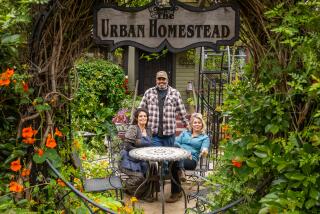Doctor Sets Sights on Turning Farm Into Diversified--and Profitable--Business
- Share via
CENTERVILLE, Ohio — Dr. Edward R. Thomas Jr. is an eye doctor whose vision always has been down on the farm, even if the farm is just a stone’s throw from suburbia in this city south of Dayton.
“My father bought it (in 1942) as a gentleman farmer. He loved farming. He loved the out-of-doors. But at the time we had no idea we’d be what we are,” Thomas said, surveying the 64 acres he calls Gourmet Garden.
“We’ve been in the farm produce business since ’46. As a child I used to run a small stand out here and sold to the markets in town.” That childhood business has grown to become a bustling farm market and one of the leading suppliers of quality produce to specialized markets and a few of the area’s better-known restaurants. Thomas, 51, bristles a little if anyone calls him a gentleman farmer.
“This is not a hobby; it’s a business,” he said, pointing out that he spends many hours tilling the soil and nurturing the crop.
Ted van Ruiten, 45, who joined Thomas as a partner and farm manager last year, said the farm wll gross about $500,000 this year.
The farm, originally 120 acres, along with another 300 acres near Wilmington, used to be a grain and livestock operation. The Wilmington land is still mostly a traditional farm, though Thomas and Van Ruiten are introducing fruit trees there.
Suburbia had grown to the farm’s doorstep, and eventually the family donated half of the Centerville farm for a high school.
Then Thomas had a vision, and about two years ago the seed corn made way for sweet corn--and snow peas, snap beans, okra, peppers, squash, melons and turnips.
“I realized that there was just no future for the time being in grain farming, and the cattle market was poor,” he said. “I was getting more sleepless nights over that than I realized I would over a smaller, more intense operation.”
This year came 8 1/2 acres of the mini-vegetables that are the darlings of modern cooking. Van Ruiten, who spent 27 years in the nursery business before joining Thomas, is working on getting those cultivated in what he said is generally poor soil for the varieties.
“Our success lies in the location. We get a high price on our produce, and we’re not afraid to admit to that,” he said.
Van Ruiten, who is Dutch, said his European background and the contacts he had made in the nursery business helped get Gourmet Garden products in the doors of some restaurants. Keeping them there is strictly a factor of quality, he said.
To that end, he tries to use bacteriological pest control or biodegradable insecticides, such as Sevin, whenever possible.
He says he often spends half a day on the road drumming up business and another half a day on the telephone. Van Ruiten and Thomas said that getting markets was the most difficult and most important part of the produce supply business.
They also acknowledge that Thomas’ other income gives them some flexibility, but they play that down, saying other farmers can develop markets if they work at it.
“I think 90% of the farmers can do it,” Van Ruiten said. “They need to diversify because beans and corn are not a profitable crop. But you also can’t plant crops randomly and expect to make a profit.
“I think we have an advantage where there is some capital funding and we can afford to try something different.”
Thomas says he tries to plant about 20% of the crops as new varieties each year, and wants to install greenhouses for an eight-month growing season. He believes the 20-acre truck farm will make a comeback.
And there will be changing market trends. Right now, the physical fitness and health craze is lining his market basket with profits.
More to Read
Inside the business of entertainment
The Wide Shot brings you news, analysis and insights on everything from streaming wars to production — and what it all means for the future.
You may occasionally receive promotional content from the Los Angeles Times.









